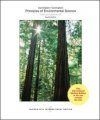Textbook
Out of Print
By: William P Cunningham(Author), Mary Ann Cunningham(Author)
448 pages, colour photos, illustrations, tables
![Principles of Environmental Science (International Edition) Principles of Environmental Science (International Edition)]()
Click to have a closer look
About this book
Contents
Biography
Related titles
About this book
Rather than the 25 to 30 chapters found in most environmental science textbooks, the authors have limited Principles of Environmental Science: Inquiry and Applications to 16 chapters – perfect for the one-semester, non-majors environmental science course. True to its title, the goal of this concise text is to provide an up-to-date, introductory view of essential themes in environmental science along with offering students numerous opportunities to practice scientific thinking and active learning.
Contents
Chapter 1: Understanding Our Environment
Chapter 2: Environmental Systems: Matter and Energy of Life
Chapter 3: Evolution, Species Interactions, and Biological Communities
Chapter 4: Human Populations
Chapter 5: Biomes and Biodiversity
Chapter 6: Environmental Conservation: Forests, Grasslands, Parks, and Nature Preserves
Chapter 7: Food and Agriculture
Chapter 8: Environmental Health and Toxicology
Chapter 9: Climate
Chapter 10: Air Pollution
Chapter 11: Water: Resources and Pollution
Chapter 12: Environmental Geology and Earth Resources
Chapter 13: Energy
Chapter 14: Solid and Hazardous Waste
Chapter 15: Economics and Urbanization
Chapter 16: Environmental Policy and Sustainability
Customer Reviews
Biography
William Cunningham is a professor of cell biology at the University of Minnesota. He received a B.S. degree in biology from Southwest Texas State College in 1959 and a Ph.D. in botany from the University of Texas in 1963. He was a Postdoctoral Fellow at both the Wenner Gren Institute in Stockholm, Sweden, and Purdue University. He holds memberships in many biological/educational societies and organizations and has received numerous honors and awards. Dr. Cunningham has devoted himself to education and teaching development at the undergraduate level in biology. He began his educational career in structural biology but for the last 10-15 years has concentrated on environmental science, teaching courses such as Social Uses of Biology; Garbage, Government, and the Globe; Environmental Ethics; and Conservation History. Within the past four years, he has received both of the two highest teaching honors that the University of Minnesota bestows – The Distinguished Teaching Award and a $15,000 Amoco Alumni Award. This year he is serving as Faculty Mentor for younger faculty at the university, sharing the knowledge and teaching skills that he has gained during his distinguished career.
Textbook
Out of Print
By: William P Cunningham(Author), Mary Ann Cunningham(Author)
448 pages, colour photos, illustrations, tables

































